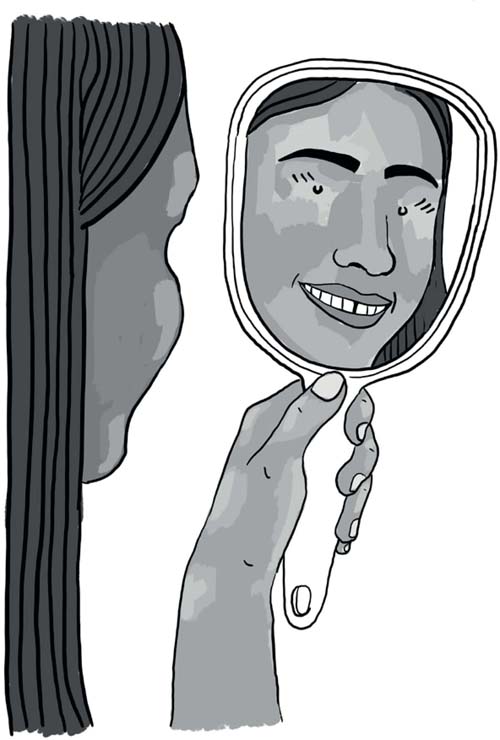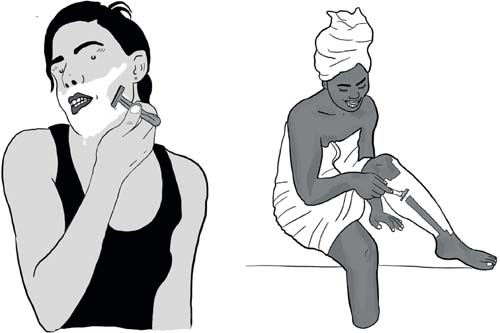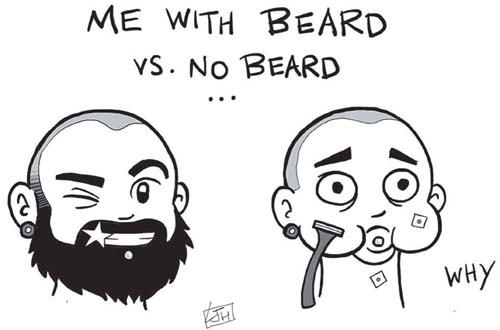
CHAPTER 7
PUBERTY AND HOW TO COPE
UH OH, IT’S PUBERTY
Puberty can hit at different times for different people. Those who were assigned female at birth (AFAB) generally start their puberty between the ages of 10 and 14 whereas those assigned male at birth (AMAB) generally start theirs between 12 and 16 years. This is when your body starts changing and your secondary sex characteristics start developing. For trans people, these physical changes can be absolutely devastating – having to go through physical changes that don’t align with your identity and how you want your body to develop can cripple people with fear, anxiety and distress. It’s therefore vital that those who require them can access hormone blockers, which can alleviate and halt the effects of puberty until people can make a choice of whether to start cross-hormones and start a physical transition or not. We will talk further on puberty blockers below, but let’s start with some of the physical changes that occur when you hit puberty.
Note: The sections below refer to people who are dyadic (not intersex). Intersex people might experience puberty and the physical changes in entirely different ways, depending on their sex characteristics.
PUBERTY FOR AFAB PEOPLE
One of the first signs that someone who is AFAB has started their puberty is when they have their first period (menstruation). This means that your body is releasing certain hormones that affect the uterus and ovaries and that your reproductive organs are starting to work. Periods cannot really be described as anything pleasant, as they can involve intense cramps and bleeding from three days to more than a week once a month. Menstruation varies between people and can affect them differently.
Other physical changes that occur are that breasts start growing, hips start widening, there is hair growth, the skin changes, bones start to lengthen and some acquire a different shape, and there are changes in fat distribution and muscle development, which can sometimes lead to stretch marks forming. Certain hormones start working in the body that will continue to shape your body in certain ways as you continue to age.
Menstruation is often closely associated with womanhood and being a woman, so sex education or discussions about menstruation and pregnancy can often be very centred towards cisgender people and their bodies. Due to the fact that sex education and the general discourse about these matter are so bound up with traditional ideas about womanhood, AFAB people can be profoundly affected by puberty. Not only does it involve physical changes, but it can often have deep psychological effects on AFAB people who aren’t women, triggering depression, distress and dysphoria.

Fox Fisher
Things are slowly shifting, however. More and more people are realising and accepting that sex education is quite excluding for trans men and trans masculine people, and inclusive sex education is on the rise. Instead of talking about the bodies of women and that certain body parts and reproductive organs are ‘female’ or ‘women’s parts’, people are now talking about the actual physical attributes of hormones and organs without specifically gendering them. This is quite easily done and often does not involve big changes. This doesn’t mean that women who menstruate or are mums are being erased; it just means that we are being inclusive of everyone. Women will still be women, and mums will still be mums. It’s also important that we mention that not everyone who menstruates is a woman and not only women can get pregnant.
PUBERTY FOR AMAB PEOPLE
Puberty for AMAB people usually occurs a bit later. Hair grows, the voice deepens, fat distribution changes; bones start to lengthen and some acquire a different shape; and the body generally starts growing and taking on masculine features (e.g. a bigger jaw). It becomes easier to build muscles, and there is beard growth, widening of the shoulders and more. Sperm production also kicks in, the testicles drop and reproductive organs start working. This can cause distress for some people, especially trans people who want genital surgery. The physical changes that AMAB people go through are often harder to change with hormone treatment as testosterone has more dramatic effects on the body and bone structure. Luckily, with modern science, we are now able to intervene and stop the changes of puberty with something called hormone blockers, which will be our next topic of conversation.

Fox Fisher
PUBERTY BLOCKERS: PUTTING PUBERTY ON PAUSE
Puberty blockers (also known as hormone blockers or hormone stoppers) are medicines that have been used for quite some time now. They have been used for all sorts of different things, but in the case of trans people they are taken to slow down the effects of puberty so that trans teens don’t have to go through a puberty that could absolutely devastate them. It’s about alleviating some of the distress they might feel, i.e. puberty blockers are used to increase the wellbeing of trans teens and prevent dysphoria, depression and poor mental health. Puberty blockers can therefore be a lifesaver for trans teens. If you feel like they would be the right choice for you, you should start seeking information about the closest clinic that could provide them for you. There are a few clinics around the UK that offer this service, so hopefully you won’t have to travel too far. Puberty blockers can be prescribed at the start of puberty and are prescribed for a few years at a time, or until people are between 16 and 18 years old. Around that age you can make a decision on whether you want to start cross-hormones that will start shaping your body and sex characteristics in a way that you want. Later on, when you are 18, you can make decisions on whether you want to undergo any surgeries. Just remember that you are under no obligation to do so, and that all trans people and their journeys are different. Just be you.

Lewis Hancox
If you are lacking support from your parents or they require more information, you can always contact organisations such as Mermaids (see Chapter 2), which support trans kids and their families. This also applies if the clinic you are going to isn’t providing you with the services or the support you require.
BUT HOW DO I COPE?
Coping during a puberty that doesn’t align with your gender identity can be very hard. It can be absolutely devastating to go through having your body change in ways you don’t want it to. This can lead to depression, anxiety and distress. Almost every trans person who has gone through the wrong puberty will be able to tell you that it was a very unpleasant time. Some trans people even went through very dark times and became reckless and sought comfort in the wrong places.
Thankfully today, it is much easier to get support and access to services. There are many organisations that can support you and your family through the process. The most prominent organisation in the UK is Mermaids. As well as offering a range of services, including support and counselling for trans kids and their families, they have built a wonderful community of parents and trans kids that would welcome you and your family with open arms. They are easily found online and their contact information is given in Chapter 2.
Our advice is to seek support and help sooner rather than later. Getting access to hormone blockers might take a while as the clinics often have a long waiting list and it might take the people around you some time to come to terms with things. Don’t put it off for too long though – we promise you that coming out and being true to yourself will always ultimately be better.
Most importantly, you have to remember that you will get through it. No matter how hopeless it might seem, no matter how hard it might be, there is always a light at the end of the tunnel. There are always options and there are always ways. There is a community out there that can support you, so seek the support you deserve. If you’re not getting it from your home environment, reach out to the trans community and get involved, even if it’s just through online communication or social media. Being and feeling alone is the worst feeling in the world, and reaching out to other people like you can only lead to positive things. You’re not alone – we’re here and we will support you.
Once you become old enough – around 16 years old – you can normally start cross-hormones. This means you can start hormone treatment to take oestrogen or testosterone. They bring forth certain physical changes in your body which we will describe in Chapter 2.